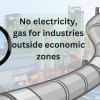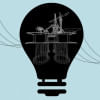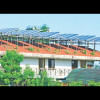Bringing electricity to more Bangladeshis

Tens of millions of Bangladeshis have gained access to electricity over recent years. In 2000, just 32 percent of the population had electricity access; today that figure stands at nearly 60 percent, according to the World Bank.
Yet the national energy sector still lags behind many of its neighbours, and the power Bangladesh manages to generate is unreliable - blackouts and shortages cost an estimated 0.5 percent of GDP annually. What are the smartest ways to bring reliable energy to more Bangladeshis?
New research by David Roland-Holst, University of California, Berkeley, and Herath Gunatilake, Asian Development Bank, along with consultant Bjorn Larsen, analyses the smartest ways to power the country in coming years.
Currently, natural gas accounts for more than 80 percent of fuel used for power generation. However, a British Petroleum study estimates that given existing production and demand, gas reserves could be exhausted in the next two decades.
Out of multiple energy policies considered, the analysis finds that reforming natural gas prices and making coal a primary energy source for electricity production would do the most social good for Bangladesh. Shifting toward coal would cut electricity costs across the economy, and the cheaper energy would raise incomes for households and businesses, while improving export competitiveness, creating overwhelmingly positive impacts even when including the climate impact costs.
Over the next 15 years, replacing half of natural gas electricity with imported coal and expanding electricity production to meet demand would cost Tk. 172 billion. It would also increase CO2 emissions, at a social cost of Tk. 7.7 billion. But in total, the widely available and cheaper power would increase the economy by Tk. 4.2 trillion. In all, each taka spent would do 23 takas of social good.
Investment to develop a domestic coal industry, however, would create even larger benefits in terms of economic growth. The cost of additional electricity production associated with this growth would be Tk. 783 billion and lead to climate costs of Tk. 46.2 billion. The benefits from the investment, however, would be astonishing. The net worth over the next 15 years would be greater than Tk. 20 trillion - equivalent to more than an entire year of GDP. By 2030, the average Bangladeshi will be 16 percent richer.
There has been significant political resistance towards the potential land disruption from coal mining, the setting of coal power plants, and concern about more pollution. But given such tremendous benefits, the authors point out there would be substantial resources available to address these concerns, even to the extent of including state-of-the-art technology to live up to the most stringent OECD clean-air requirements. The investment would give 24 takas of benefits for each taka spent.
Yet, for millions of rural homes, electrification is still far off. Most use dirty kerosene lamps to light their homes. A new analysis by A.K. Enamul Haque, Professor of Economics at the East-West University in Dhaka, examines alternative lighting options for rural households.
Over recent years, a much-touted solution was delivered to three million rural Bangladeshi homes: solar lighting. A donor-funded programme gave these families a Tk. 2,000 subsidy to purchase solar units, with the bulk of the cost financed with micro-credit.
The programme is seen as a remarkable development success: it has lighted millions of homes with clean energy, and at no cost to the national government. But is it truly the best strategy to light off-grid homes? In cities, after all, millions of Bangladeshis have chosen diesel generators to light their homes during power cuts - few if any chose solar power.
Over two decades, solar energy costs each household roughly Tk. 67,000. Given usage of four hours per day, an hour of solar power costs Tk. 4.59. Since solar power provides higher quality lighting, each taka spent does just under 2 takas of good.
Alternatively, five rural households could buy a diesel generator together - for about Tk 15,000 - - and split the costs to operate it. The total cost, including fuel over 20 years, is about Tk. 134,000- or just Tk. 26,800 per household. Each hour of electricity, therefore, costs just Tk. 1.84, and each home could be lighted for two additional hours each day, thanks to the lower costs. And even though the generator emits CO2, the climate costs are rather small at Tk. 190 annually.
It turns out that switching five households from kerosene lamps to a single diesel-powered generator would be 12 times more cost-effective than solar power - each taka of spending would do an impressive 24 takas of good.
Given that diesel is five times cheaper, all the money spent on solar energy for 3 million households could have powered 16 million households with diesel. Smarter spending could have helped 13 million more Bangladeshi households get power cheaper. This shows why it's crucial to study costs and benefits of alternative policies, rather than simply doing what seems to be in trend at the moment.
How would you help power Bangladesh for the future? We want to hear from you at https://copenhagen.fbapp.io/energypriorities. Let's continue to discuss how to do the most good for every taka spent.
The writer is president of the Copenhagen Consensus Center, ranking the smartest solutions to the world's biggest problems by cost-benefit. He was named one of the world's 100 most influential people by Time magazine.

 For all latest news, follow The Daily Star's Google News channel.
For all latest news, follow The Daily Star's Google News channel. 








Comments